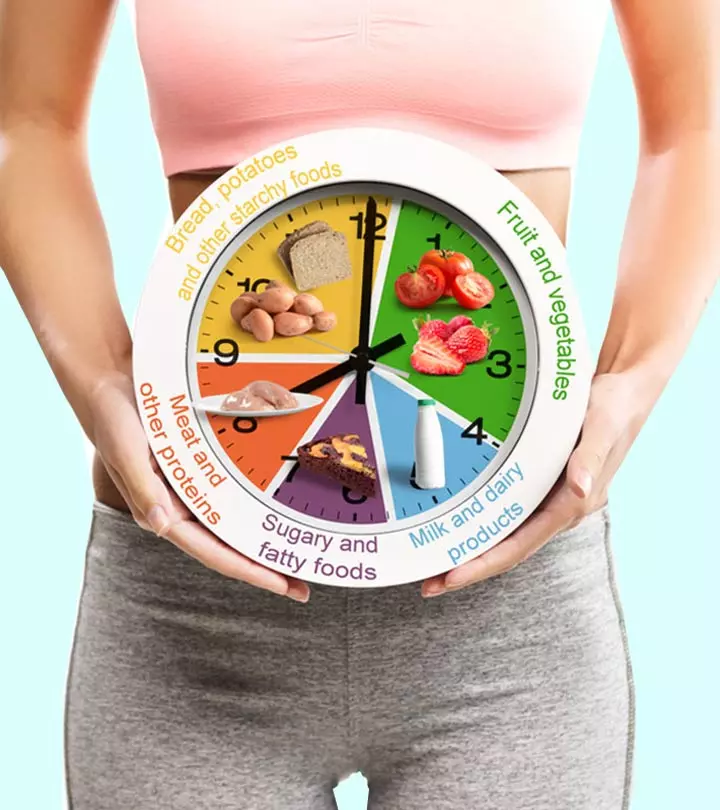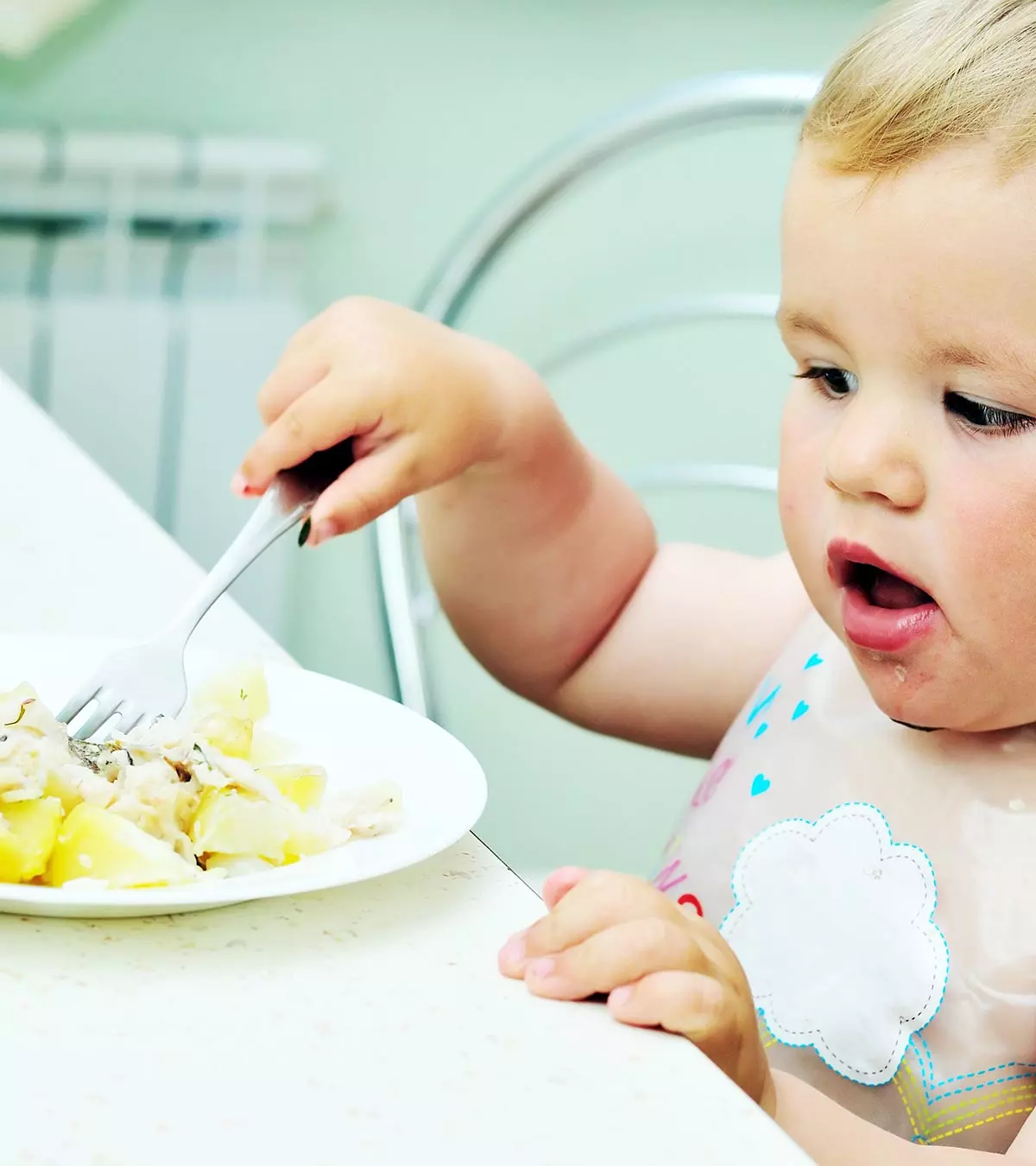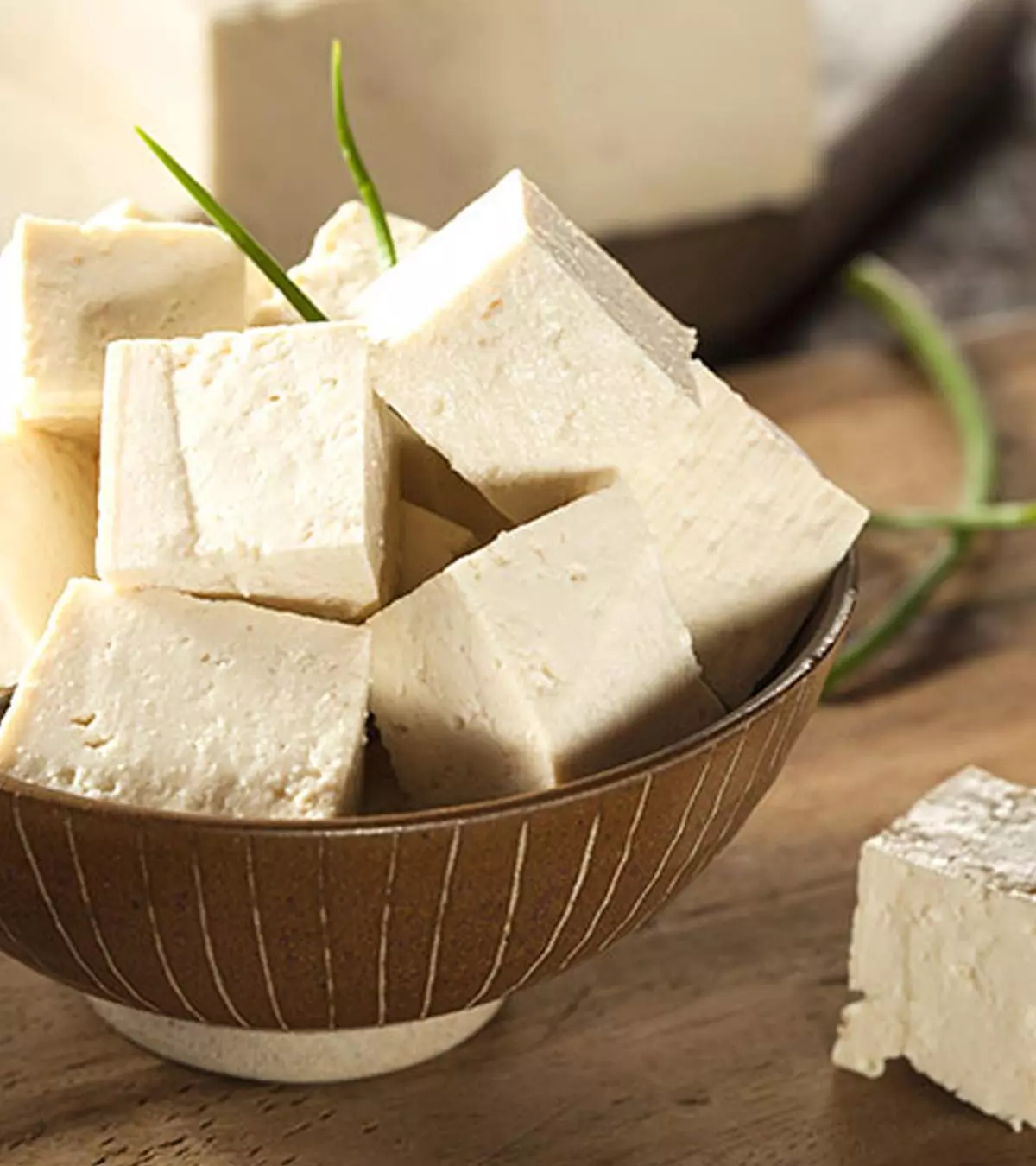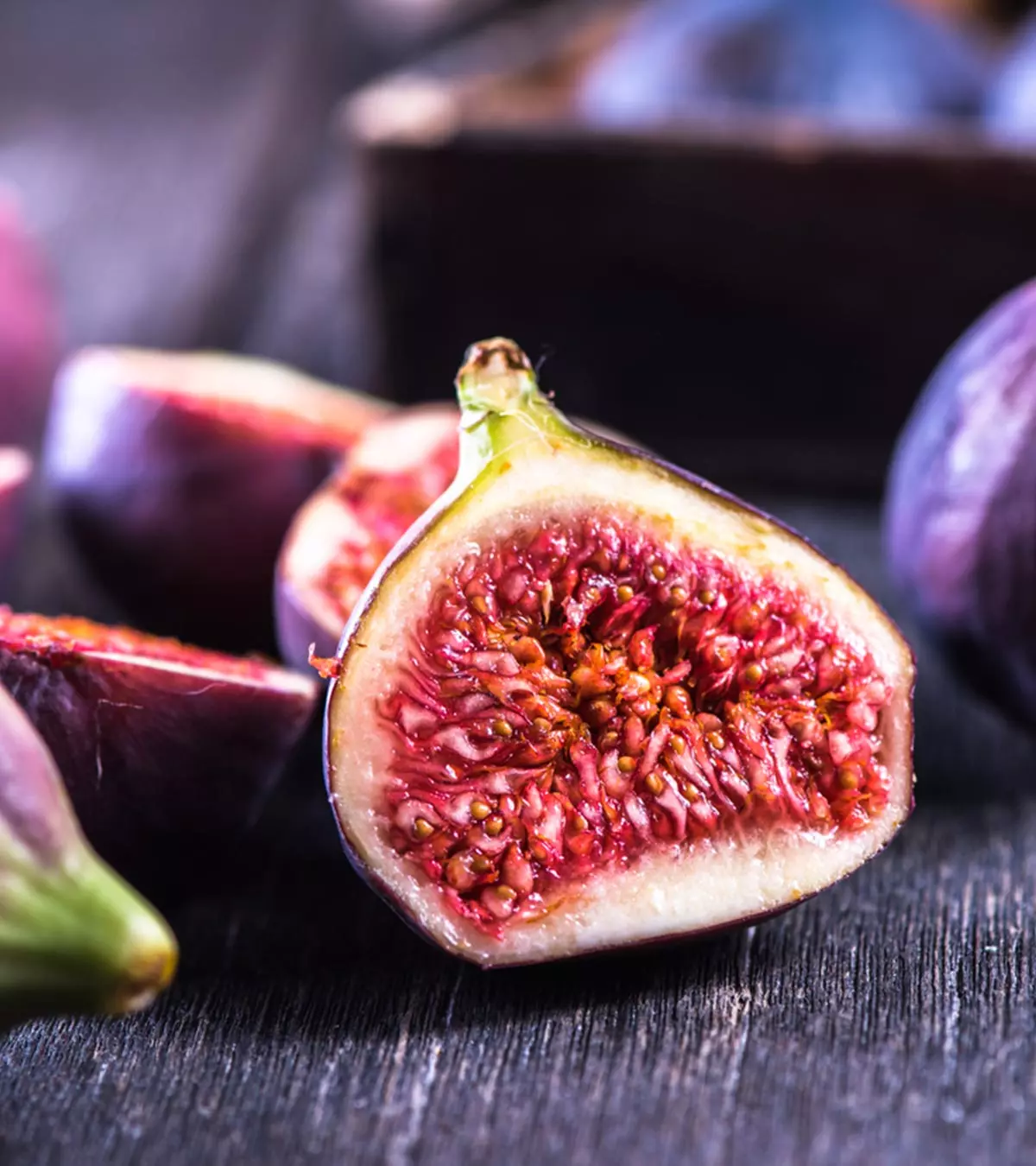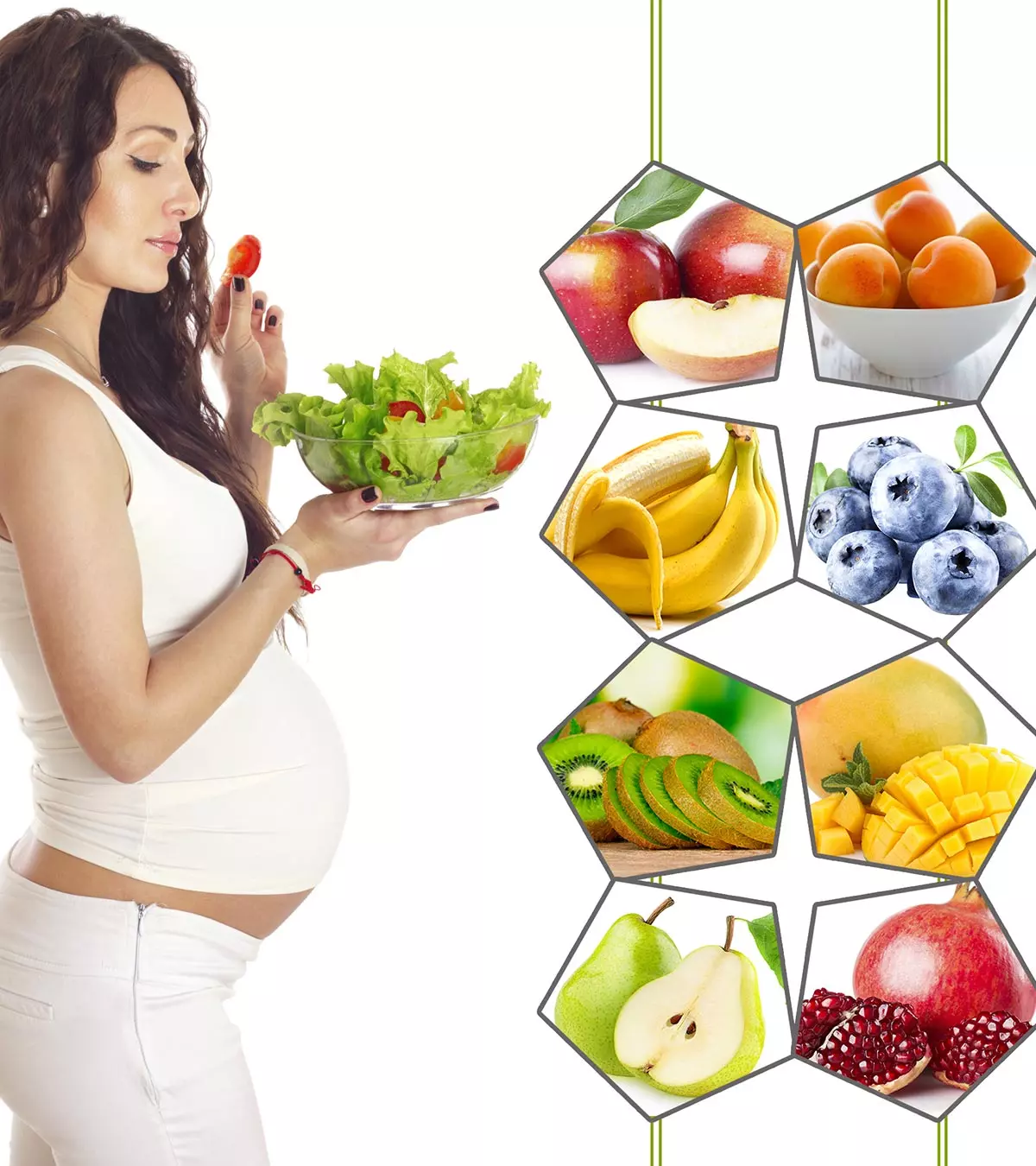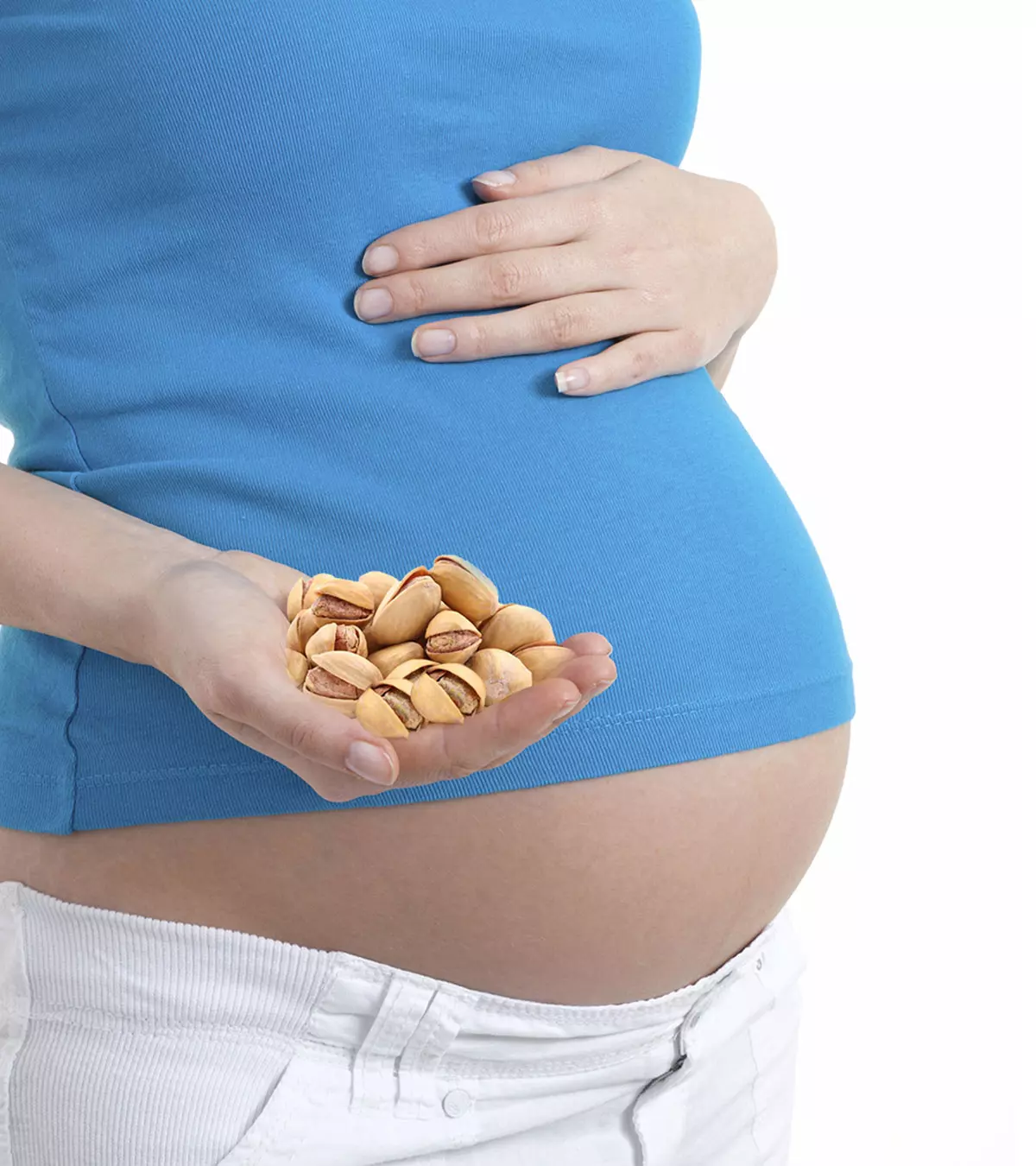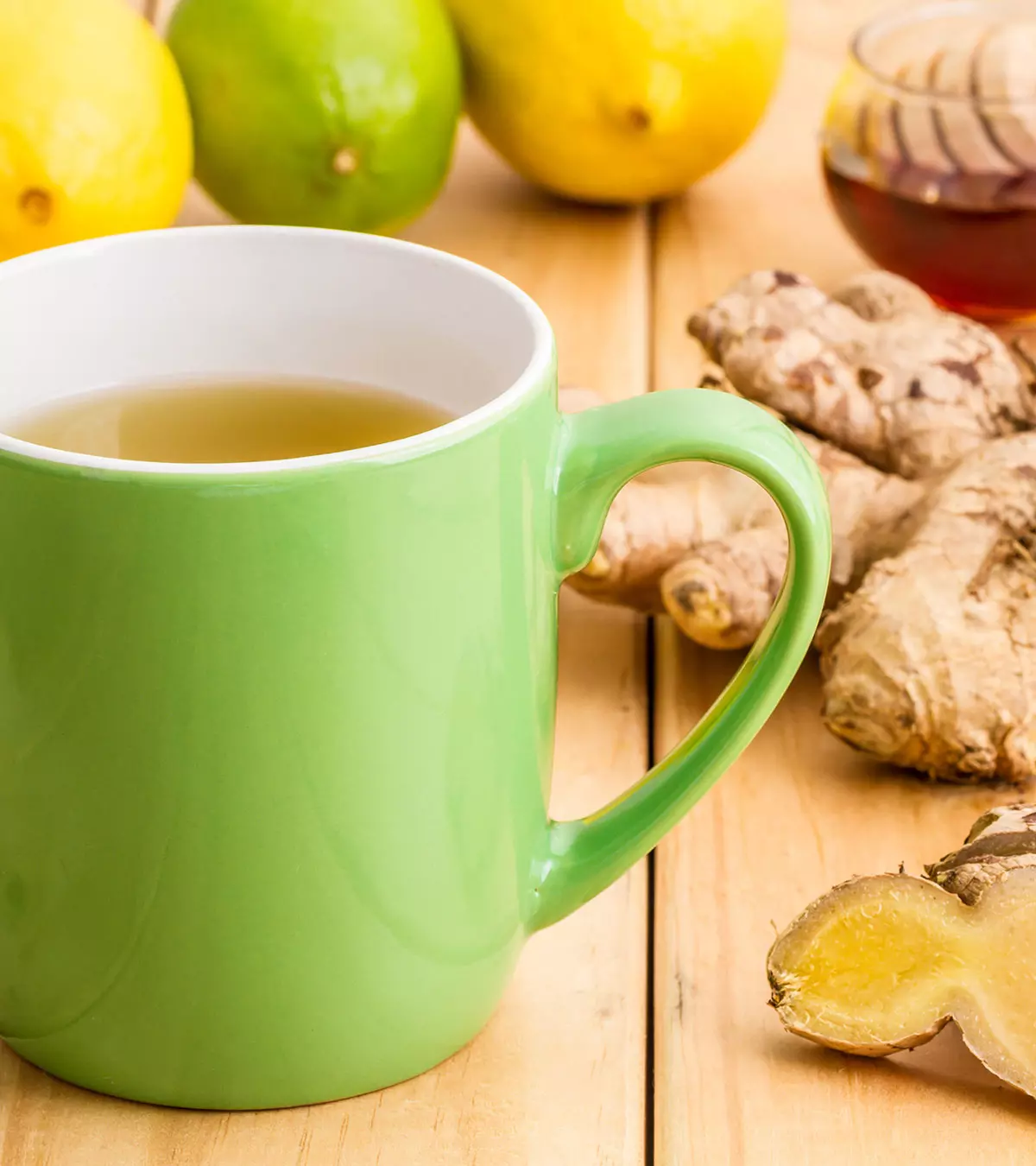
Image: ShutterStock
You may experience different cravings each month of pregnancy, and your diet can change accordingly. So, here we discuss the 5th-month pregnancy diet. As you enter the 5th month, you will notice changes in your body, such as growing belly and increased exhaustion.

The second trimester of pregnancy may cause you to be hungrier and have strange food cravings as the baby grows (1). Therefore, it is especially important that you eat the right foods to stay healthy and keep your developing baby healthy as well.
In addition, your hormones are constantly fluctuating, which adds to the cravings. Therefore, you should ascertain what you should eat and what you should avoid.
Read on as we have put together all the pieces of information about a healthy and balanced diet that you may follow during your 5th month of pregnancy to have a complication-free and comfortable journey.
Key Pointers
- In the second trimester, the baby experiences rapid growth spurts.
- The mother may experience an increase in appetite, cravings, exhaustion, and changes in her body.
- Staying hydrated and consuming protein-rich foods, nutrient-rich salads, and plenty of fruits, greens, and grains are beneficial for both mother and baby.
- During pregnancy, it is not recommended to consume caffeine, alcohol, carbonated drinks, high-fat foods, and fruits such as papaya and pineapple.
5th Month Of Pregnancy Diet: What To Eat?
1. Beef up your fluid intake

Stay hydrated at all times. Remember, you have to take care of two people now. Drink plenty of water for optimal hydration and to avoid constipation. In addition to water, consuming at least 2 glasses of milk every day will provide you with calcium and micronutrients that are vital for your baby’s healthy bone development (2).
2. Eat protein-rich foods
Proteins are the building blocks of our body. They are considered as the best 5th month pregnancy food. A diet rich in proteins is essential to ensure a baby’s physical development is on the right course. Muscles, skin and organs need protein to grow and sustain themselves. Include chicken, eggs, nuts, pulses and cereal in your diet. Additionally, include fatty fishes like salmon and sardine in your diet to get a fair amount of vitamin D and essential fatty acids (3). If you are a vegetarian, you can always go for soya chunks, steamed chickpea, cottage cheese and tofu (4).
 Quick tip
Quick tip3. Rely on salad power
Salads made from raw veggies like cabbage, carrots, fresh tomatoes, rocket leaves and beetroot are a great way to include minerals and fiber in your diet.
Avoid using salad dressings and pickled veggies like olives and capers, because they are high in sodium content. Make sure you drink plenty of water so that constipation is at bay (5). It is suggested that pregnant women should have on average 1 ounce of fiber per day. Excess fiber in the diet can also result in complications such as hemorrhoids.
4. Have some fruits

Fruits are brimming with vitamins and minerals, and they taste delicious too. You can never get bored with fruits and you never run out of choices. There are apples, pears, bananas, kiwis, oranges, berries, and currants to choose from that are rich in vitamin C and selenium (6) (7). Why not blend some strawberries and yogurt and make a healthy smoothie?
5. Eat your greens
Eating a lot of green veggies might get boring. But do it for the sake of your little one. Include spinach, fenugreek, kale, and broccoli in your diet to fulfill the body’s need for iron and vitamin A (8). You can bake or grill the veggies to add some zing to them. You could also throw in a handful of spinach in your smoothies (9).
6. The wholesome goodness
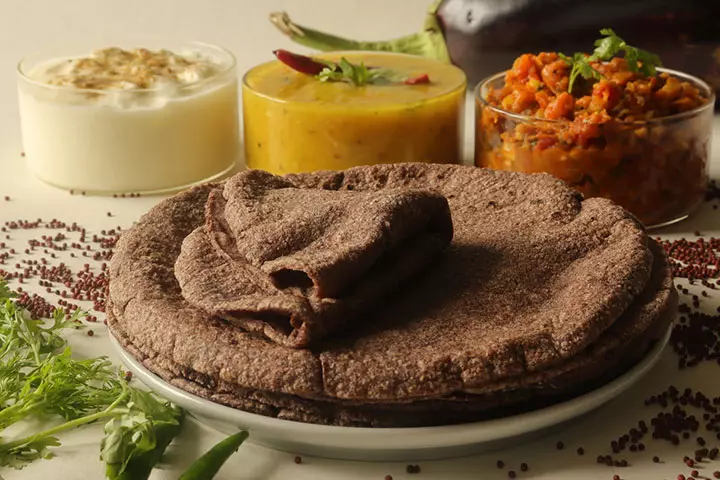
As part of healthy eating, you should include high-fiber and organic whole grains in your diet in the form of flatbreads, which are a high source of carbohydrates. Whole grains such as wheat, ragi, rice, millet, quinoa, corn, and oats are rich in vitamin E, vitamin B complex including vitamin B6 and vitamin B12, iron, folate, omega-3 fatty acids, and magnesium and fulfill the growing baby’s need for energy and nourishment very well (10) (11).
5th Month Of Pregnancy Diet: What Not To Do?
Now that you’ve grabbed the must haves, here are some foods that you should include in your fifth month of pregnancy diet to steer clear of.
1. Say no to fizz
Carbonated drinks contain caffeine, sugar, and unhealthy calories, which can lead to excessive weight gain and increased risks of gestational diabetes. You definitely don’t want your calories to come from all the wrong sources, do you? Instead, consume fresh fruit juices and lemon water (12). According to the Morbidity and Mortality Weekly Report, during the year 2018-2025, 13.5% of pregnant women were currently drinking, and 5.2% were reported binge drinking in the United States.
2. Fruits you shouldn’t eat
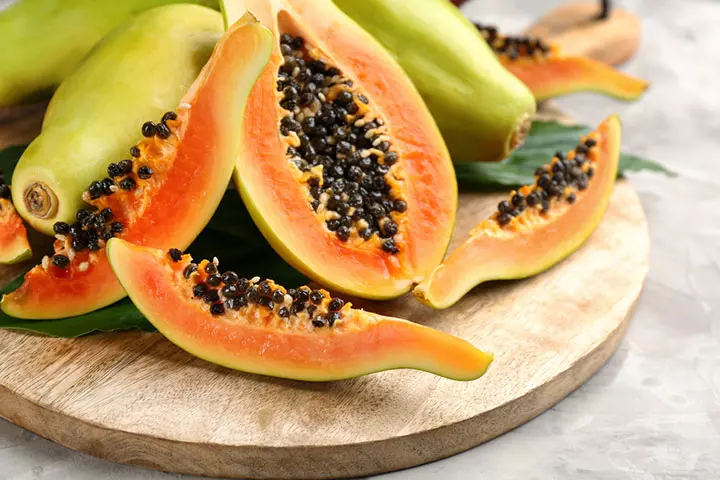
Tropical fruits are packed with micronutrients and fiber, improve digestion and taste yum! But feasting on tropical fruits during pregnancy is not a great idea. Papaya and pineapple are known to induce uterine contractions in pregnant women, leading to miscarriage. Avoid the use of meat tenderizers because they contain raw papaya extracts or similar enzymes that break protein down (13).
3. Throw the goblet away!
If you happen to be one of those ultra modern ladies who don’t mind sipping on alcohol, you will need to quit drinking for some months now. Heavy drinking during pregnancy can cause congenital defects in the baby. However, the impacts of an occasional binge are not yet clearly known. But it is better to abstain from alcohol to avoid any potential risks (14).
4. Kick the butt
Smoking is proven to hinder a baby’s development and cause physical anomalies. The harmful chemicals inhaled during smoking can lead to indigestion or heartburn (15). It can deprive a baby of its oxygen supply, hamper the development of the baby’s respiratory system and cause its heart rate to go haywire. It might as well induce miscarriage or result in stillbirth (14).
 Quick tip
Quick tip5. Cut back on caffeine

Both tea and coffee contain caffeine. So, you must restrict your tea/coffee intake to a maximum of 2 cups a day. High caffeine intake during pregnancy is known to cause restlessness and sleeplessness in babies after they are born. You certainly don’t want your baby to wail endlessly through the initial days after it is born (12).
6. Avoid fatty food
Don’t let the desire to binge on fries and pizzas get the better of you. The hormonal changes and ‘eating for the 2’ thing are enough to throw you off the scale. You should avoid eating fattening foods and canned stuff as well. An abnormal weight gain can cause unwanted complications during the gestation period.
7. Avoid raw seafood
If it’s sushi you crave while pregnant, ensure you have one with only cooked ingredients. Seafood is healthy during pregnancy, but avoid anything raw or undercooked. This includes raw or chilled fish, raw oysters, sashimi, sushi made with raw seafood, smoked or cooked ready-to-eat, and chilled prawns. These foods are at a higher risk of being contaminated by listeria bacteria, the causative agent of listeriosis. Listeriosis is a rare illness that is 20 times more common during pregnancy. It causes mild to moderate infection (food poisoning) in pregnant women and may potentially impact the developing fetus (may cause stillbirth or preterm birth) (16) (17).
Frequently Asked Questions
1. What vitamins and minerals are essential for my fifth month of pregnancy diet?
Vitamins A, C, D, B6, B12, and folic acid are considered important during pregnancy. Crucial minerals may include calcium, iron, iodine, and choline (18).
2. What types of snacks can I eat during my fifth month of pregnancy?
When it comes to foods to eat during pregnancy, healthy snacks such as yogurt (with probiotics) or smoothies blended with cocoa, berries, nut butter, or avocado are good choices to boost nutrition and improve metabolism. Other options include hard-boiled eggs, soaked or roasted nuts, salads with beans, and hummus with vegetables (19).
3. What portion sizes should I aim for during the fifth month of pregnancy?
Pregnant women with ideal weight and adequate exercise may consume (in their second trimester) about seven ounces of grain-based foods (bread, rice, or pasta), three cups of vegetables, six ounces of proteins (eggs, lean meat, seafood, and beans), three cups of dairy, and seven teaspoons of fats and oil (olive, avocado, and nuts) (19).
4. How much weight should I expect to gain during my fifth month of pregnancy?
Most women should gain about one pound (0.5 kilogram) a week during the second and third trimesters of pregnancy. However, this may vary depending on the body weight at conception and the number of fetuses being carried (20).
5. How can I manage my weight while ensuring proper nutrition during pregnancy?
During pregnancy, the focus should be on consuming a healthy, balanced diet rather than losing weight. Incorporate whole grains, fresh fruits, vegetables, lean proteins, and low-fat dairy products into your diet, and avoid processed foods, added sugars, and unhealthy fats. Light exercises, like walking and yoga, can help you stay at a healthy weight and feel good during pregnancy (19). Before starting any new exercise routine, get approval from your doctor.
The baby’s organs, including the brain, heart, kidneys, and liver, have already assumed their basic shape by the time a woman reaches the fifth month of her pregnancy. Therefore, both the mother and the baby require significant nourishment with the right type of 5th-month pregnancy diet. Make sure to drink enough water and eat a well-balanced diet that includes protein-rich foods, green vegetables, and fruits. However, avoid coffee, excessive calories, and alcohol that might be harmful to your pregnancy. In case of concerns, speak to a dietician who may create a diet plan specifically for the fifth month of pregnancy.
Infographic: Foods To Eat And Avoid During Pregnancy
Pregnancy is a crucial phase where diet plays an important role in defining the health and development of the baby. Having nutrient-dense whole foods belonging to all food groups ensures that the mother gets complete nutrition and can nurture a healthy baby. Read this infographic to know what foods to eat and avoid during this time.

Illustration: Momjunction Design Team
Illustration: 5th Month Of Pregnancy Diet - Which Foods To Eat & Avoid?

Image: Stable Diffusion/MomJunction Design Team
References
- Food cravings during pregnancy.
https://www.pregnancybirthbaby.org.au/food-cravings-during-pregnancy - Hydration and Pregnancy.
https://www.nutrition.org.uk:443/nutrition-for/pregnancy/ - Vitamin D
https://www.nhs.uk/conditions/vitamins-and-minerals/vitamin-d/ - Nicole E.Marshall et al.; (2025); The importance of nutrition in pregnancy and lactation: lifelong consequences.
https://www.sciencedirect.com/science/article/pii/S0002937821027289 - Rachelle A. Pretorius and Debra J. Palmer; (2025); High-Fiber Diet during Pregnancy Characterized by More Fruit and Vegetable Consumption.
https://www.ncbi.nlm.nih.gov/pmc/articles/PMC7824257/ - Vitamins and minerals
https://www.betterhealth.vic.gov.au/health/healthyliving/Vitamins-and-minerals - Banana: A Nutritive and Nutraceuticals-Rich Fruit
https://krishi.icar.gov.in/jspui/bitstream/123456789/1279/1/4%20-%20Banana%20fruit%20nutritive%20%28English%29.pdf - What Is a Superfood Anyway?
https://health.clevelandclinic.org/what-is-a-superfood - Iron-rich Foods for Pregnancy.
https://americanpregnancy.org/healthy-pregnancy/pregnancy-health-wellness/iron-rich-foods-for-your-pregnancy/ - Whole grains.
https://nutritionsource.hsph.harvard.edu/what-should-you-eat/whole-grains/ - Eat Healthy During Pregnancy: Quick Tips.
https://odphp.health.gov/myhealthfinder/pregnancy/nutrition-and-physical-activity/eat-healthy-during-pregnancy-quick-tips - Fruits to Avoid During Pregnancy Diet.
https://www.apollocradle.com/blog/pregnancy/fruits-to-avoid-during-pregnancy-diet - Dangers of drinking, smoking, caping while pregnant
https://unmhealth.org/stories/2025/06/alcohol-smoking-vaping-pregnancy.html - Indigestion and heartburn in pregnancy.
https://www.nhs.uk/pregnancy/related-conditions/common-symptoms/indigestion-and-heartburn/ - Foods to avoid when pregnant.
https://www.pregnancybirthbaby.org.au/foods-to-avoid-when-pregnant - Vanitha Janakiraman; (2008); Listeriosis in Pregnancy: Diagnosis Treatment and Prevention.
https://www.ncbi.nlm.nih.gov/pmc/articles/PMC2621056/# - Nutrition During Pregnancy.
https://www.acog.org/womens-health/faqs/nutrition-during-pregnancy# - Nutrition During Pregnancy.
https://www.waterburyhospital.org/all-services/womens-health-program/obstetrics-and-gynecology/patient-education-folder/nutrition-during-pregnancy/ - Managing your weight gain during pregnancy.
https://medlineplus.gov/ency/patientinstructions/000603.htm# - 13 of the Best Vegetarian and Vegan Protein Sources
https://health.clevelandclinic.org/13-of-the-best-vegetarian-and-vegan-protein-sources - Morning Sickness (Nausea and Vomiting of Pregnancy)
https://my.clevelandclinic.org/health/diseases/16566-morning-sickness-nausea-and-vomiting-of-pregnancy#:~:text=Morning%20sickness%2C%20also%20called%20nauseamiddle%203%20months%20of%20pregnancy
Community Experiences
Join the conversation and become a part of our nurturing community! Share your stories, experiences, and insights to connect with fellow parents.
Read full bio of Dr. Pamela Adhiambo Muga
Read full bio of Anshuman Mohapatra
Read full bio of Swati Patwal
Read full bio of Dr. Joyani Das







